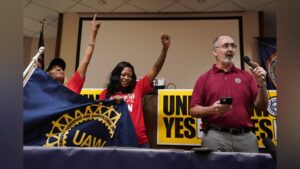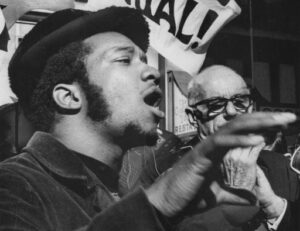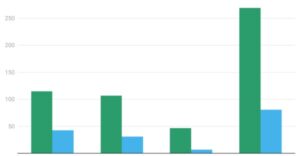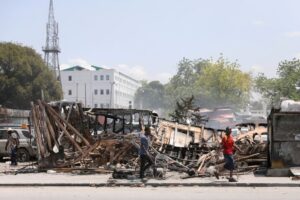On June 19, the presidential ticket of Gustavo Petro and Francia Márquez won a narrow, but important, victory in Colombia. It was the first time in modern history that a center-left government won a national election. The Petro-Márquez victory marked a critical defeat for the right-wing bloc, allied with far-right paramilitaries and drug lords, with former president Álvaro Uribe that had dominated Colombian politics for decades (called “Uribismo” in the article). But as Roberto Montoyareminds us in this article originally published in the Madrid-based socialist magazine Viento Sur, the right will not take its defeat quietly. When they take office in August, Petro and Márquez have a mountain of challenges in front of them. Translated to English by International Socialism Project.
The victory of the Petro-Márquez ticket in the recent Colombian presidential elections is a historic milestone, without a doubt. Unimaginable until recently… but the battle is not yet won.
It has been a great triumph of the “nobodies,” of those who, after the first round, understood that a second-round alliance of different currents of the right who had run separately in the first could, could, as they did in 2018, prevent the election of a left government in Colombia.
The collapse of Uribismo, the concentrated expression of the conjuncture of interests of unscrupulous landowners and big businessmen, multinationals, the armed forces, powerful narco-paramilitary groups, and right-wing media, did not in itself guarantee the defeat of the right.
Simple math allowed us to foresee a clear victory for the right if it managed to unite around the oddball candidate Rodolfo Hernández. His straightforward and populist rhetoric and his unwillingness to be pinned down on his program would allow him to get the votes of prejudiced voters and of those who feared change under Petro. Hernández, blessed by Biden—despite his resemblance to Trump—thus appeared as the ideal anti-Petro candidate in a polarized electorate.
As happened in Chile last December, the discredited traditional political parties fell by the wayside and unexpected far-right figures emerged to challenge left-wing candidacies, José Antonio Kast in Chile, and Rodolfo Hernández in Colombia. Although differing in their backgrounds, Kast and Hernández had certain important features in common: populist in form, neoliberal in economics, far-right ideologically, as Javier Mileialso represents in Argentina. [Milei is an economist and parliamentary deputy with whom the far-right has managed to enter the Parliament for the first time since the last military dictatorship.]
The grotesque septuagenarian tycoon Rodolfo Hernández is as pathetic, as unbelievable, as were other well-known billionaires— such as Silvio Berlusconi or Donald Trump—who jumped into the world of politics. However, their absurdities did not prevent either Berlusconi or Trump from coming to power in Italy or the US.Nor did it prevent Jair Bolsonaro in Brazil.
The Hernández phenomenon was manufactured in the space of a few months. Different right-wing families clung to it after the first round in a desperate attempt to preserve the established order, the status quo.
A mobilization from below that threw down the forecasts
The nobodies understood the danger and mobilized in the most remote places in Colombia. It is not an exaggeration to say that many walked or rode horses for days, because there are enough testimonies and videos of it. They crossed mountains and rivers to reach distant polling stations to cast their vote. They understood what was at stake.
The Historical Pact program was not everything, nor was the charisma and political experience of Petro, former mayor of the capital, a city of more than seven million inhabitants in Bogotá.
The presence at his side of Francia Márquez, a combative Black social movement fighter with a long history—so well known for her long battle in favor of social minorities—was of vital importance in mobilizing peasants and indigenous people, those environmental activists that every day risked their lives fighting against deforestation, against open-pitmines, defending the land against attacks from the landowners and their armed thugs. Márquez managed to excite and mobilize the LGTBI community, and the feminist movement as well. With her unquestionable courage and her track record, she was able to transmit hope to social sectors that Petro had not yet managed to convince.
The ghost of the genocide of the Patriotic Union
In the first place, the candidates have to survive until August 7, the day set for Gustavo Petro and Francia Márquez to assume their positions as president and vice president, respectively, and stay alive after that.
During the last stage of the electoral campaign, Petro was forced to cancel several public meetings in places controlled by the narcos and the paracos [paramilitary gangs], traditional allies of Uribismo. In other campaign appearance, he had to speak from behind bulletproof glass. Death threats in Colombia are not to be taken lightly. Hiring a hit man is too cheap.
Colombia holds the world record for presidential candidates shot to death: in 1987 Jaime Pardo Leal and in 1990 Bernardo Jaramillo Osa, the two presidential candidates for the Patriotic Union. In that same year, 1990, the favorite, Luis Carlos Galán, and Carlos Pizarro Leongómez, one of the main leaders of the M-19, the same guerrilla group to which Gustavo Petro belonged as a young man, were also assassinated. In 1995, presidential candidate Álvarez Gómez Hurtado, of the MSN (Movement for National Salvation), was also assassinated.
For all the militants of the Historical Pact, the ghost of the massacre of members of the Patriotic Union (UP), to which Pardo Leal and Jaramillo Osa belonged, is more present than ever. The latter was assassinated by a 16-year-old hit man on the orders of the drug lord Pablo Escobar. The UP was a coalition created in 1984 by the Revolutionary Armed Forces and the People’s Army (FARC-EP) after the Peace Agreements signed by these armed groups with the Government of Belisario Betancour.
The FARC-EP and the government then signed an armistice, and the hope that this kindled in a large part of the population made many sectors who favored peace to join the coalition that, in 1986, achieved very good electoral results, entering the Congress of the Deputies and Senate and obtaining 335 local councilors. Pardo Leal obtained 10 percent the vote. By the time those elections were held, nearly 300 UP militants had already been killed. He had managed to break the governing liberal/conservative duopoly for the first time in the country’s history. This set off alarms among the powerful of Colombia and the United States.
After these electoral results, the murders intensified even more. Militants and sympathizers of the Patriotic Union became targets to be killed by the far-right narco-paramilitary groups, in complicity with the security forces and conservative political forces. The head of any of its members was worth many dollars. The murders of mayors, councilors and the massacres of dozens of activists or simple UP voters in rural villages intensified even more after the municipal elections of 1988 when the UP became the third political force in Colombia.
According to a 2022 report [details here] from the Special Jurisdiction for Peace, in addition to the two assassinated presidential candidates, the UP had 5,733 victims. Of these, there were 4,616 murders and the rest were forced disappearances. The state ended up recognizing many years later that the UP had been subjected to genocide. The vast majority of these crimes went unpunished.
The FARC-EP declared the truce broken and began a major offensive against the leaders of the drug trafficking clans and paramilitaries who were the perpetrators of thousands of crimes, and the war resumed its full intensity. The UP was banned but years later recovered its legal status when the state recognized that its members had been murdered en masse. While not the same as its original incarnation, today the Patriotic Union is part of the coalition of the Historical Pact that gave the electoral victory to the Petro-Márquez ticket.
Guarantees not to enact “communism”
The political, economic and media pressure is so intense that Petro has been forced to give guarantees publicly and in front of a notary—yes, in front of a notary—that he does not intend to end capitalism, that he does not want to implant communism or follow the Cuban model or the Venezuelan model, neither massively expropriate property, nor end private property.
“We don’t exactly love capitalism, but first we have to overcome pre-modernity,” Petro repeats. He is aware that the progressive coalition that he leads together with Francia Márquez obtained 50.4% of the votes—a very good result. But Hernández won 47.3%. Colombia is today divided into two large political blocs. It will not be easy for it to weave alliances and to gain a sufficient majority in Congress to be able to carry out important economic, social, and political reforms. Petro already knows first-hand the pressure from the de facto powers-that-be when he was mayor of Bogotá (2012-2015). Then, the City Council prevented him from carrying out several of his most important reforms.
In a country with 39 percent living in extreme poverty, the world’s largest producer of cocaine and one of the most violent in the world, with a multitude of armed groups, drug traffickers, paramilitaries, dissident factions of the FARC and with the ELN [Ejercito de Liberación Nacional, the other major guerilla group in the country that has reached out to the incoming government], nothing will be easy.
This is especially true given that Colombia has been for decades a fundamental platform for U.S. military and counterinsurgency operations in a large area of Latin America and the Caribbean. Its powerful armed forces have been trained and armed by the US. Colombia is home to eight major US military bases and is the only country in the region to achieve observer status in NATO.
Military and police commanders hate Petro and Márquez and everything they represent. They are armed forces that have pursued a brutal dirty war for decades, which included—in addition to corruption, torture, and summary executions—”false positives”, the murder of more than 6,000 young peasants and indigenous people who were killed only to pass them off as guerrillas killed in combat. These murders helped the Uribe government add to body counts showing its success against the guerillas and allowed local commanders to collect bounties and promotions. It will not be easy for Petro and Márquez to reform the military and police leadership and to radically change their goals and modus operandi. Nor will it be easy to appoint a new Minister of Defense and new police and military positions to promote that change.
The dirty media war that Petro and Márquez have had to endure in recent months, with crazy hoaxes and montages of audio and video, has poisoned the campaign so much that it has led them to act defensively, trying to reassure their critics and —as Boric also did in Chile—distancing themselves from the governments of Venezuela, Nicaragua and Cuba.
Appeasing the markets seems to be one of Petro’s short-term goals, as it is for Boric. But how do you appease some markets, some powerful agro-export businessmen and those from the oil and mining industry with a government program that proposes to put an end to extractivism, to decarbonize the country, to radically change fiscal policy and the distribution of wealth or establish a free university?
Petro does not propose to convene a constituent assembly, as Chávez, Correa or Morales did in the 2000s, nor to nationalize hydrocarbons as Morales did, nor to expropriate millions of acres of unproductive land, as Chávez did. And yet the right presents his program, both in the country and internationally, as if it is a danger to democracy and to the system.
Petro and Márquez will inherit a huge public debt, one of the largest in the history of Colombia, and acute social inequality. It is a situation of social emergency that requires rapid short-term measures, but it will also be necessary in the medium and long term to undertake a major structural reform, a reform of the system, and a change of economic model. It will be a titanic task.
The Historical Pact is a coalition of many parts that will need to consolidate itself in order to face a currently divided but still powerful opposition. It will have to maintain and broaden its social base, win over that part of the intoxicated and prejudiced electorate that fears change, that fears “communism,” the bogeyman on which the right and the country’s elite will wield to prevent Gustavo Petro and Francia Márquez from effectively controlling real power in Colombia.
Roberto Montoya, journalist and writer, is a member of the Advisory Council of Viento Sur.




